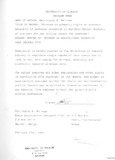| dc.description.abstract | The purpose of this study was to test for the type of
property rights regime operating in range resource utilization
in Northern Kenya. African nomadic pastoralists have
occasionally been accused of following socioeconomic and
resource-use strategies that are destructive to the
environment and land resource base. This paradigm is commonly
referred to as the tragedy of the commons.
The problem was analysed by determining the optimization
process that the pastoralists use in economic decision making
through the discount factor and the theory of rational
expectations. A nested model was developed to test for the
presence of res-nullius (open access property) versus res
communes (true common property). The data used consisted of
time series livestock numbers, livestock sales (off take),
livestock prices, labour costs, low income consumer price
indices, interest rates and ecological indices, all from the
Marsabit district, Northern Kenya.
Results obtained for Marsabit district from this study
suggest that res nullius property rights apply in production
of small ruminants (goat and sheep). However, camel and cattle
production are res communes. This result suggests that there
is a need to destock small ruminants while increasing the
number of camels and cattle. Camel populations have been
decreasing naturally due to fertility problems and therefore,
may not threaten environmental destruction. The problem of
open access range depletion seems to apply in resource
management strategies of Marsabit district as regards
harvesting of forage resources through small ruminants (goats
and sheep). Cattle and camel production seems to operate under
res communes regime.
Traditional property rights institutions don't seem to
apply today, because of external interference. Past government
policies have neither helped set up new sustainable
institutions nor strengthened traditional institutions. | en |

